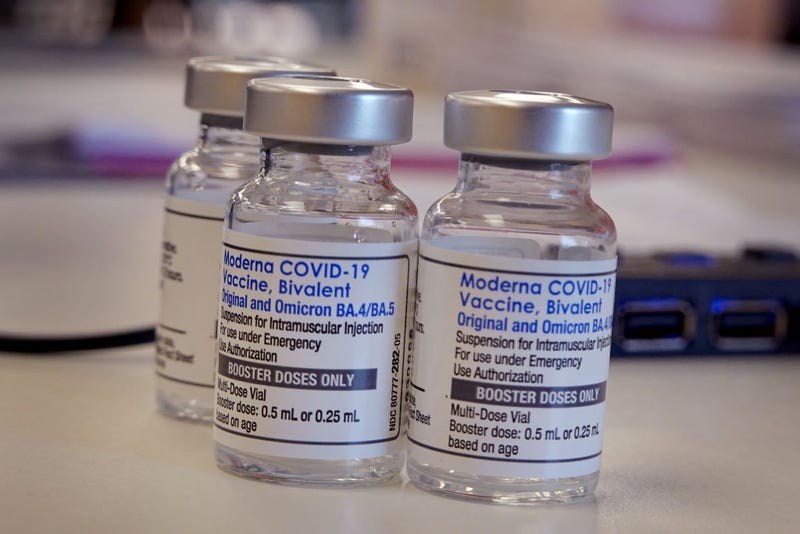
Medical experts are again encouraging people, especially those with higher risk factors, to get an Omicron COVID booster.
However, many people are saying they don't know about it, they don't know that it's approved for them, and they don't know if they really need another booster.
So, where do we stand on the latest booster shot? Dr. Frank Rhame, an infectious disease specialist at Allina Health, spoke to WCCO Radio’s Drivetime with DeRusha to clear up some of the misconceptions about it, and who he thinks “needs” to get the next shot.
Jason DeRusha: Did you get the booster?
Dr. Frank Rhame: On the first day I could. I'm an old guy so I'm more in jeopardy than most. People who really need it are the people who are over 65, or have a chronic illness, or live with somebody who does, because you don't want to give it to your housemates or your family members if they are vulnerable.
DeRusha: 68% of the US population has received the COVID shot, but only a third has chosen to get a booster. Now this additional omicron booster. I've been reading polling that shows a huge percentage of the public doesn't even know that it's available. It's sort of felt like a soft launch. There hasn't been much noise about it. Why do you think that is?
Dr. Rhame: Well, let me tell you, first of all what it is, because it's bivalent. That means it's got representation of two different strains of COVID. So until this one came along, every single vaccine is basically derived from the original Wuhan strain from 2.5 years ago. So this baby's been mutating to beat the band. What this thing has got is half that old strain and half the new strains that are circulating now, mostly in the country, the B.A. 4 and 5. So it's got new strains that are currently circulating and that's better. You get better antibiotics to the currently circulating strains if you get the bivalent booster.
DeRusha: I haven't gotten the booster, the second booster. I got the first booster already. And I've been sort of trying to examine my own thoughts as to, you know, why didn't I rush out and get it? For someone like me, I'm 47, no risk factors. What advice would you give somebody like me?
Dr. Rhame: The percentage play is to get, no matter what. But the people for whom it's real important are the ones I mentioned, over 65, chronic illness, or being around somebody that you don't want to give it to who's in those situations.
Let me just riff on another aspect of vaccines. Vaccines behave very differently. We have some vaccines that produce dense immunity that the original illness produces dense immunity. Hepatitis A, measles, mumps, rubella, these things that natural illness produces dense immunity, and the vaccine produce dense immunity. We've got other illnesses for which vaccines don't work at all. Like HIV. We've got some of the vaccines that work very poorly like TB and malaria. And we've got two viruses, one is respiratory syncytial virus and one of the coronaviruses, that looks like we do not either from natural illness or vaccine developed durable immunity, we need to keep taking them over and over again. So the original coronavirus is the one that cause, like the common cold, people will get them over and over again after a couple of years. Your immunity is gone. So our immune system does not seem to be able to produce durable immunity to coronaviruses. So we are going to have to take repeated vaccines to be maximally protected.
DeRusha: So far in Minnesota, at least as of last week, Axios reported that fewer than 200,000 Minnesotans have received a dose of the updated boosters. So it's really just 5.5% of eligible people 12 and over. The reason I bring it up doctor, is because with the fall coming and the winter coming, we don't know what's going to happen with COVID. Anecdotally, I certainly feel like I'm hearing about more friends and coworkers and whatever the case may be of people who are going down with COVID again?
Dr. Rhame: So we still have over 100,000 people dying in this country every year from COVID. That beats everything else you've got, overdoses, guns, cars accidents. So we have a lot of people dying but they're mostly all non-vaccinated or under-vaccinated. So, imagine this thing is over when we got more than 100,000 people dying a year.
DeRusha: That's a lot. A nuts and bolts type question. If you've had COVID recently, should you wait to sort of maximize the benefit of the booster? How long should you wait?
Dr. Rhame: Great question. So you should wait at least three months after your last case of COVID. You should wait at least two months after your last COVID booster and you need to have had a primary series before you get this bivalent booster.
DeRusha: One of our texters, Rob said that his theory as to why no one wants a booster is because people don't trust the CDC, Fauci, everything related to kind of the governmental messaging around COVID.
Dr. Rhame: That’s the tenor of our times. And it's really sad because you know, sometimes people are right.

